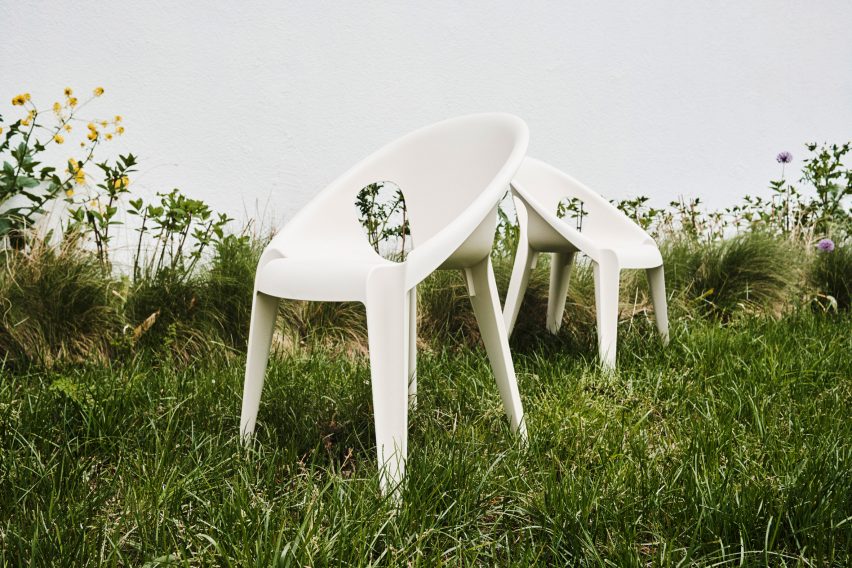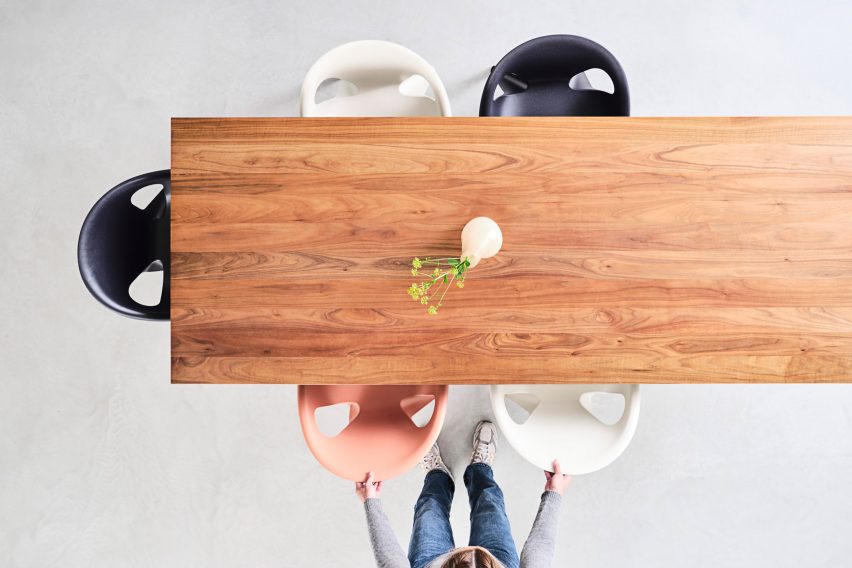Italian brand Magis has launched Bell Chair, a lightweight, low-cost stackable monobloc chair made of recycled polypropylene. In this exclusive video produced by Dezeen, designer Konstantin Grcic explains how he created a product that is "just over half of the weight of a normal chair".
Launched today with a dedicated website, the injection-moulded chair comes in three colours and can be used indoors and outdoors. It retails for just €77 and weighs 2.7 kilogrammes.
"It's just over half of the weight of a normal chair," Grcic said in the video interview with Dezeen's founder and editor-in-chief Marcus Fairs. "It's quite sophisticated."
The chair is made from industrial waste from Magis' production facilities and can be recycled again at the end of its life. "But its life is designed to be long," said Grcic, speaking from his studio in Munich. "We are not designing a chair that is disposable within years."

In the video, recorded remotely using video-conferencing app Zoom, Grcic described the form of the chair as "an eggshell with four C-shaped legs."
The ovoid form ensures the chair achieves the maximum strength from the minimal amount of material while the C-section legs allow it to be stacked in towers of up to 24 units.
Monobloc chairs, made from a single piece of injection-moulded plastic, are the most common type of chair in the world.
When asked what was different about his design, Grcic said: "Well, in a way, nothing. But we are not reinventing the chair; we are following certain kind of principles."

"So if you think of a monobloc chair, we have a seat-and-back shell and four legs," he added.
"And the chair had to be stackable. You have to design everything in such a way that structurally it's strong, but with as little material as possible. The best way to do that look at an egg-shaped shell."
Magis gave Grcic a tough but simple brief for the chair. "The parameters were quite simple: a monoblock plastic chain injection moulded in polypropylene," he explained.
"In order to achieve [an affordable price point], we knew that we could only use a certain amount of material. That creates a chair of a certain weight."
"And that means a certain cycle time on the machine because what costs money is not so much the material but the production time on the machine," he said. "We had to be able to produce the chair in less than a minute. And that has a lot of implications for the design."
Grcic rethought the entire production and distribution process in order to keep the price and weight of their chair as low as possible.
Distribution costs have been reduced by shipping the chair in vertical stacks of 12 units on a specially designed pallet.
"That was another kind of requirement," Grcic said. "A lot of chairs are stacking, obviously, [but] they're stacking in a kind of slight diagonal. We had to create a vertical stacker in order to keep to the footprint of just one chair for packaging."
Once the chairs come out of the moulding machine "they stack them into this pallet and that pallet then goes straight into the warehouse and on the truck and so on," Grcic explained.
Grcic, who set up his studio in Munich in 1991 after studying design at the Royal College of Art in London, spoke to Fairs about his history with Magis.
The designer's long-running relationship with the brand began with Chair One, a die-cast aluminium chair first produced in 2003.
Grcic went on to create numerous other products for Magis, including a cast iron sofa inspired by machinery parts and a chair with a backrest like a pool noodle.
Magis was founded in 1976 by Eugenio Perazza. Amongst the furniture producer's other products is a rotation-moulded chair that resembles a spinning top by Thomas Heatherwick, a wavy plastic bench by Ron Arad and the often-copied Bombo stool by Stefano Giovannoni.
This video was produced by Dezeen for Magis. All imagery is courtesy of Magis.
